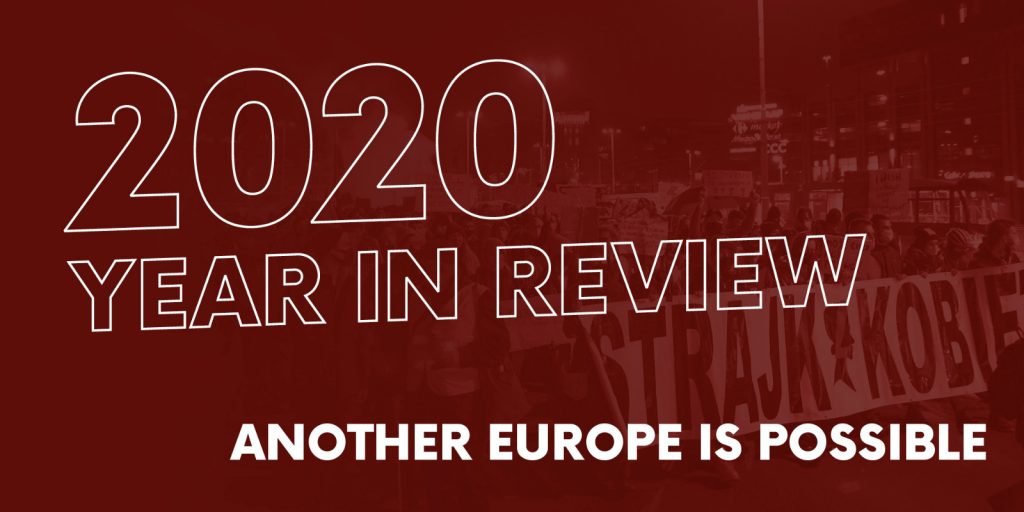It has, by all accounts, been a difficult year. In the wake of a catastrophic defeat for both the left and the anti-Brexit movement, we have faced an era-defining pandemic. 2020 was not just a year of political mismanagement and economic crisis – it has borne witness to an unfolding human tragedy. Another Europe has approached these events in the only way we can: by standing firm behind our principles and objectives, organising what we can, and adapting to a situation in which face-to face campaigning has been very difficult, if not impossible.
From 2016 to 2019, much of our focus was on the prospects for elections and referendums, and on parliament where the votes were constantly tight. Much of our activity was grassroots campaigning: we organised big protests, doorknocked, ran stalls and distributed propaganda in the hope of causing a fuss and persuading people. In 2020, a Tory-dominated House of Commons meant that our strategy had to turn outwards towards movement building at exactly the moment at which most of our campaigning activities became untenable because of the pandemic. Nonetheless, we have had a considerable amount of success and impact despite the conditions in which we have operated.
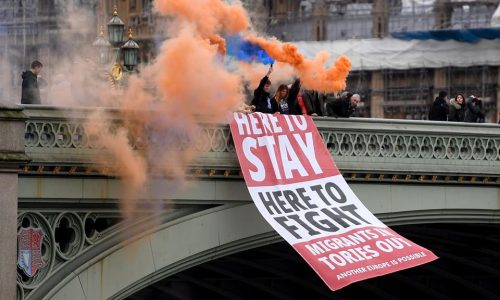
Brexit: deals, extensions and the future
From the moment that the exit poll was released on 12th December 2019, we knew that any prospect of stopping Brexit was dead. A majority of the population had voted for parties promising a second EU referendum, but because of Westminster’s voting system, the Tories were handed a large majority with which they had promised to ‘get Brexit done’. On January 31st, the UK left the EU. With the immediate battle over Brexit over, we decided to focus our strategy on four pillars:
- Stopping the worst and most damaging elements of the government’s Brexit programme: particularly on migrants’ rights and the US trade deal
- Shaping public opinion on key issues so that the Tories are less likely to win future elections; and working with allies to foster movements of resistance
- Pushing for an EU which in the short term supports our aims, and which in the medium term is democratised and reformed
- Ensuring that when the left returns to power, it does so on a manifesto which reflects our aims
A month after the UK left the EU, we would be in the grips of a global pandemic, and within two months the UK would be in nation-wide lockdown. Despite this, and the ensuing crisis of public health and the economy, the government pressed ahead with its Brexit negotiations; it had, after all, claimed that it had an ‘oven ready’ deal which it intended to strike with the EU. With the pandemic raging all around us, this was always a ridiculous moment to attempt adversarial negotiations with the UK’s nearest neighbours, and we were some of the loudest voices demanding that the Brexit transition period be extended so that the government’s plans could be scrutinised properly. Throughout 2020, we ran a series of digital campaigns on Erasmus, free movement, the deal, the prospect of extension and so on, generating tens of thousands of letters to MPs – but ultimately, we need more time and space to be able to mobilise opposition to the government’s agenda.

With the Brexit process progressing, it was essential that someone set out a progressive vision for post-Brexit Britain, and we did just that with the launch of our Alternative Mandate in June. The document, which was well received across the progressive left, is a full programme of demands on the Brexit process, on everything from freedom and movement and migrants’ rights, to environmental and consumer protections, to science funding and agricultural policy. Its thirteen points were endorsed not just by Another Europe’s core coalition but by a range of other groups and trade unions who have not fully supported our campaigning work before. You can see it all here. The document will remain the basis of our campaigning work in the years to come.
Despite the lockdown, we also moved to mobilise as many people as possible. Our spring conference, Resist 2020, had to be moved online in early April, but it attracted a big crowd and provided a space to rally the anti-Brexit movement and the left. Later in the year, we held a series of rallies under the banner of Fight for The Future, which brought together hundreds of people in regionally-segmented events for London, the North East, Yorkshire, the North West and the Midlands. The events played a role as organising spaces, and managed to organise socially distanced stalls and campaigning sessions across the country focussed on the Right to Stay campaign and the US trade deal (see below). We hope to organise more Fight for the Future events for more locations in 2021.
In early September, Boris Johnson issued an ultimatum that if no Brexit deal was reached by October 15th, the UK would walk away from the trade deal talks and a No Deal Brexit – an outcome for which the government developed an array of euphemisms such as ‘an Australian style deal’ – would take place. The ultimatum was to prove hollow, and Brexit negotiations continued all the way until Christmas Eve, when it was finally announced that a deal would go to parliament on December 30th. Another Europe led the public campaign calling on Labour not to vote for the deal, and although Keir Starmer remained wedded to voting for Tory Brexit deal, a large-scale rebellion took place, with around forty Labour MPs joining the SNP, Lib Dems, Plaid and Caroline Lucas in refusing to lend their support.
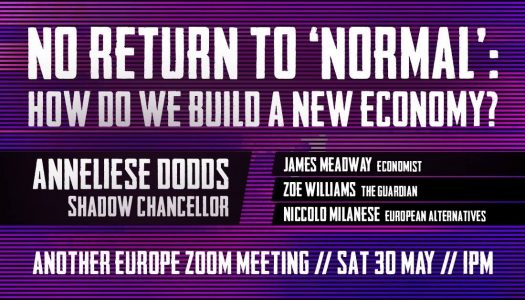
Covid-19
It is not a coincidence that many of the countries experiencing the worst Covid pandemics are run by right wing nationalists. Donald Trump in the US and Boris Johnson in the UK have both presided over some of the worst death rates in the world, in part because of their nationalist exceptionalism and refusal to work internationally and abide by WHO guidance. The UK’s pandemic has been marked by an addiction to outsourcing, cronyist and incompetent administration, and an inflated sense of Britain’s unique abilities. Boris Johnson refused to participate in Europe-wide procurement for PPE, and somehow managed to spend £22bn on a contact tracing system that was delivered so late that it missed the second wave of the virus, and then only barely worked.
We ran a campaign which tried to cut against the outlook of the UK government, calling for an internationalist response to the crisis. We called for international collaboration on research and medical provision, continued British membership of the European Health Insurance Card Scheme, a moratorium on ‘no recourse to public funds’ measures as well as all immigration detention and removals, and a comprehensive set of social protections backed by public money. Looking ahead to the programme of vaccination, we joined others like our allies at Global Justice Now in calling for fundamental reform of the pharmaceutical industry based on public ownership, and a vaccine that is free and available to everyone on the planet.
Although the UK was by this point outside of the EU, Another Europe joined calls for Europe-wide action to tackle the pandemic. We joined calls for the entire Eurozone to share the cost of the pandemic with the use of Eurobonds, including facilitating the publication of an open letter to Angela Merkel. In the end, the Eurozone did enact some basic solidarity across its member states, though of course it did not do enough.
Meanwhile, as the pandemic raged around us, we put on weekly events which took place every Saturday. Thousands of people attended our Zooms during lockdown, on subjects as diverse as Black Lives Matter, violence against women, democratic ownership of the economy, the future of Scotland and the EU, new authoritarianism, climate change, the pandemic in the global south and many more. Big name speakers like Joseph Stiglitz and John McDonnell met on panels with rank and file workers from Belarus, American anti-racists and Polish feminists.
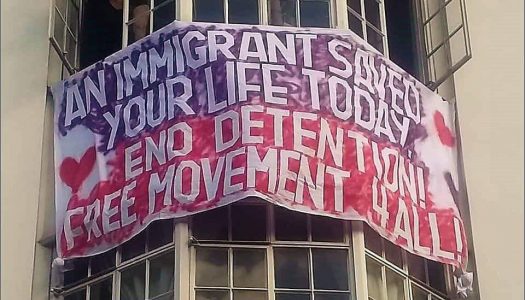
The year in migrants’ rights
The year of Brexit ascendency and the pandemic was, predictably, a bleak one for the rights of migrants, but we did organise and fight back – and made some important inroads on a number of fronts.
In March, we launched our Right to Stay campaign, which we run in coalition with the Joint Council for the Welfare of Immigrants (JCWI). There are something like four million European citizens currently living in the UK, who are currently being forced to apply for Settled Status. They have until June 2021 to be approved, or face losing their right to live in the place they call home. Even if 99% of EU citizens are approved, tens of thousands could be deported – and at the moment, the rates of success look substantially lower than that. The Right to Stay campaign was launched with the simple demand to replace the scheme with a guaranteed right to stay written into primary legislation. It has had a fair bit of success, and in September was officially endorsed by all opposition parties other than Labour.
On the wider subject of migration, 2020 saw a number of worrying developments which demonstrated the extent to which the far right was on the front foot. While the government pushed through the end of free movement and declared its intention to deepen the hostile environment in the wake of Brexit, anti-migrant voices pushed to manufacture a crisis over channel crossings. Although the number of migrants arriving in the UK by makeshift boat has been comparatively low for many years, the government and their allies in the press spun a narrative which enabled it to pose as tough on immigration. The deaths of migrants in the channel, whose bodies have been washed up on beaches, are a direct result of the government’s refusal to provide a safe passage to claim asylum. We joined calls for the UK to provide safe passage; campaigned against the Immigration Bill; and ran a number of events on topics such as ‘Fortress Britain and how to fight it’. We also backed the campaign for Osime Brown, a young, autistic, learning-disabled man who was imprisoned as a teenager under ‘joint enterprise’ rules who is now facing deportation to Jamaica, a country he has no memory of.
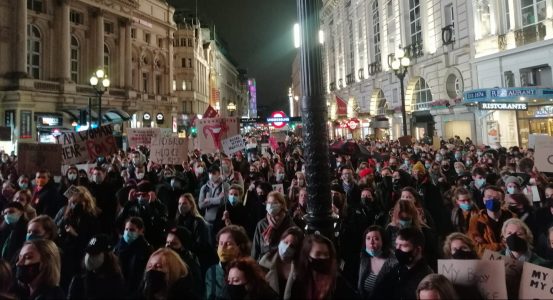
International solidarity and wider movements
While mobilising demonstrations and face to face campaigning was in general harder in 2020, there was one major exception. Following the murder of George Floyd in the US, a wave of Black Lives Matter protests spread across the world. As statues toppled and massive crowds gathered, Another Europe lent its solidarity to the protests and organised events with BLM activists from the US and Europe. Working with the Stop Trump campaign, we also promoted ‘Topple the Racists’, a crowdsourced map of UK statues and monuments that celebrate slavery and racism.
The world first breathed an enormous sigh of relief as Donald Trump lost the US election in November, and the threat of a constitutional crisis (or even a civil war) did not come to pass. His defeat means that Boris Johnson no longer has a strong ally in the Whitehouse, and that a US-UK trade deal will not happen as quickly. This is good news for us, as we can now mobilise more and more opposition to it. The dangers of a US trade deal are stark – we could face entrenched privatisation of the NHS, and widespread deregulation and loss of rights and protections – but it also presents real opportunities, because these outcomes are deeply and widely unpopular. In October, we participated in a day of action on trade called by Global Justice Now.
There were also a number of big struggles in Europe, with which Another Europe sought to solidarise. The ongoing uprising in Belarus following the country’s rigged elections in August is an inspiring rebellion against a dictator, led largely by organised workers. We were one of the few UK left organisations to raise solidarity with Belarus, holding a number of events with speakers from the front line of the strikes, and organising solidarity statements with the uprising which were signed by high profile politicians and trade unionists. Meanwhile, the Strajk Kobiet (or Women’s Strike) in Poland mobilised the country’s biggest protests since the fall of Communism in support of a woman’s right to choose following a restrictive Supreme Court ruling. Another Europe organised speakers and solidarity with Strajk Kobiet, and cohosted a lively London protest in coalition with Razem London which drew many hundreds of Polish Londoners to Piccadilly Circus.
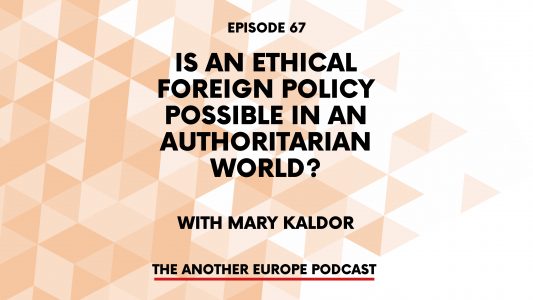
The field of ideas
In November, we established an academic advisory group to help underpin our campaigning work with high quality research. It has met several times in November and December to take stock of the state of negotiations. And produced two rapid responses to the outcome of the deal, one written by two former Labour MEPs for Labourlist, and the other from an academic and barrister pointing out how, contrary to reports, Parliament did not have a meaningful vote on the deal. The group also plans to layout a reform agenda for a closer relationship with Europe and analyse in more depth the likely implications of the UK-EU agreement in the new year.
We have also continued to produce the regular podcast, hosted by Luke Cooper and Zoe Williams, with 23 episodes published over the last year. It has reached tens of thousands of people and now includes special ‘members only’ extra material. It also enjoys considerable international reach with about one third of listeners living outside the UK. Our most popular episode of the year was a review of the history of Brexit and our role in it, ‘The Big Brexit Review: what did we get right and what did we get wrong?’. It was described by writer and Remainiac Dorian Lynskey as a “bracingly honest post mortem on the remain movement, especially its relationship with Labour, by people who were a vital part of it. I found it insightful and weirdly cathartic”. We have also used the podcast to plug our campaigning efforts, including the solidarity work we undertook around the Polish abortion rights movement, and organised a series of podcasts focused on the Coronavirus pandemic during the first phase of lockdown.
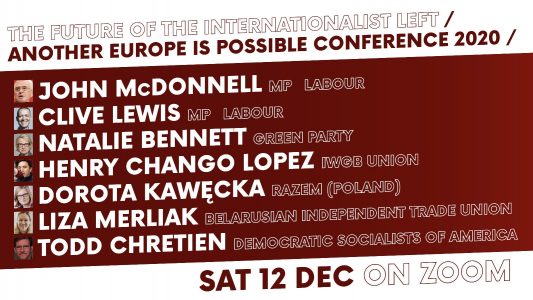
Our conference and development
On December 12th, we held our annual conference on Zoom. It was well attended, with around 170 people coming along to discuss our strategy and hear from speakers including John McDonnell, Clive Lewis, Natalie Bennett, Shaista Aziz, and representatives of Strajk Kobiet, the Belarusian revolution and the Democratic Socialists of America.
Our strategy for 2021 can now be viewed online here, and elections for our National Committee will open soon. Organisationally, Another Europe is in good health: we have around 1400 members, which is around the same as at the end of 2019 – not bad for a year in which our movement has been in retreat and campaigns have been hard to run.
‘Get Brexit Done’ was always a cheap slogan, not a serious promise. Brexit is not a quickfire policy that can be “delivered”, but a project that is designed to deregulate the economy and blame foreigners for falling living standards and social fragmentation. The politics of right wing nationalism can only be defeated from the left, with a radical economic agenda and an unapologetic defence of free movement, working class organisation, liberation for black, LGBT people and women, and environmental justice. The need for a real alternative to the politics of Johnson, Trump, Bolsonaro, Orban, Kaczyński, Le Pen, Salvini, Erdogan, Netanyahu, Modi, Alternativ für Deutschland, and others has never been so burning – and it is that alternative that we exist to nurture – in 2021 and in the years that follow it.
If you agree with us, you should join us, and you can do so here for as little as £1 per month.
31st December 2020

